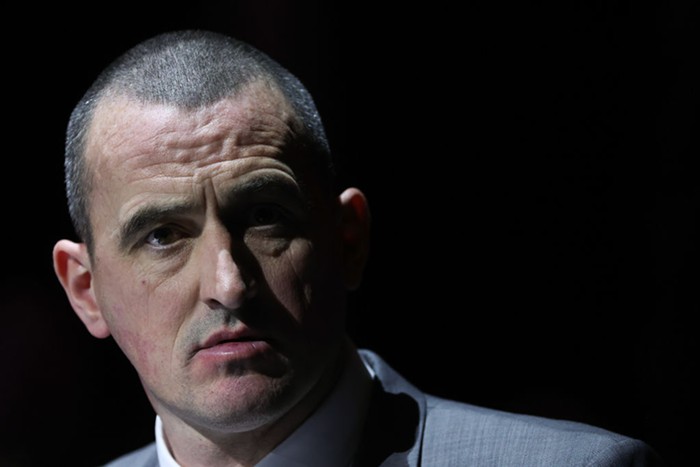
A city review released Thursday has found that the Portland Police Bureau (PPB) officer who sent protective text messages to Joey Gibson, the leader of far-right Vancouver, Washington group Patriot Prayer, did not violate any bureau policies.
In February of this year, both the Mercury and Willamette Week reported on the text messages, sent by Lieutenant Jeff Niiya and obtained through a public records request. After the texts were made public, many community members and leaders questioned whether they revealed a too-close relationship between Niiya and Gibson—and whether Niiya had violated PPB policy in the messages. Niiya sent the messages over the last two years, while acting in his capacity as a police liaison to different protest groups.
From the Mercury’s original reporting:
It's not unusual for PPB officers to contact activists who may be planning a protest. But usually, these conversations exist only so PPB can quickly get in touch with a protest group to get an idea of how many people will show up to participate or to ask about general schedule. While Niiya does ask Gibson about crowd sizes and planned future protests, he also chose to regularly give Gibson a heads up about counter-protesters and sympathize with Gibson's frustrations.
"Heads up just told 4-5 black Bloch [another nickname for antifa] heading your way. One carrying a flag," writes Niiya during a protest on December 23 2017. "We will have officers nearby but you may want to think about moving soon if more come."
Another message Niiya sent to Gibson, before Patriot Prayer's August 4, 2018 march: "As you march we move to keep you both separated. No patriots going to them no Antifa to you. If they get close we will be in between."
The messages show how Niiya worked to build a relationship of trust with Gibson that goes beyond basic event planning. In one, Niiya congratulates Gibson on his decision to run for Senate, in another, he asks about Gibson's recent visit to a hospital.
"I want you to know you can trust me. Don't want to burn that," writes Niiya in a September 2017 message.
The Mercury also reported that Niiya warned Gibson not to bring fellow Patriot Prayer member Tusitala “Tiny” Toese to a Portland rally, because there was a warrant out for his arrest. That appeared to possibly violate PPB’s “Dissemination of Information” directive, which states:
"Members shall not provide information directly or indirectly that may enable any person to avoid arrest, punishment, or to conceal or dispose of goods, money, or other valuable things stolen or otherwise unlawfully obtained."
But a review conducted by the Independent Police Review (IPR), a branch of the city auditor’s office, found that Niiya did not violate that directive. It also states that Niiya did not violate PPB polices around professional conduct and displays of bias.
IPR worked with PPB’s Internal Affairs division when conducting the review. Its findings were also reviewed by Portland’s Police Review Board, Chief of Police Danielle Outlaw, and Mayor Ted Wheeler, before being made public on Thursday. The investigation relied on text messages, interviews, and other documents.
IPR’s report states that because police warrants for arrest are already public information, Niiya was not violating policy by warning Gibson not to bring Toese to a protest.
PPB’s directive does not state whether it is permissible for officers to provide information to avoid arrest if it is already publicly available; it simply says that officers should not give out “information directly or indirectly that may enable any person to avoid arrest.”
The report also gives more information about Niiya’s motive in sending that text message.
“Lt. Niiya indicated he hoped letting Mr. Gibson know Mr. Toese had a warrant would discourage Mr. Toese from traveling to Portland to face potential arrest, or if he did come to Portland he would not fight or otherwise act in an antagonistic manner that would provoke his arrest,” reads the review. “On another occasion, Lt. Niiya sent Mr. Gibson a text message encouraging Mr. Toese to call Central Precinct and find out whether he had a warrant.”
The report also addresses concerns that Niiya displayed bias and was overly friendly to Gibson in the messages—congratulating him on running for the Senate, for instance—but finds that because Niiya also exchanged text messages with left-wing protestors, he did not show bias. Niiya’s friendly tone with Gibson is characterized as a tactic to elicit more helpful information from Gibson.
Niiya was interviewed for the review, and explained the intentions behind the texts.
“I understand how this looks and how the context of this sounds but you don't get cooperation by, bluntly, being an asshole to people, right,” Niiya said. “And whether it's the left or the right. It’s—respect is something that you have to be given, and so I respect these folks. I mean, they're —whether it's the left or right I respect what they're doing. I respect that they're willing to come out and put themselves out in a public form like this. So, are they friendly? Sure. Do I condone the actions of the group? Absolutely not.”
Outlaw and Wheeler presented the review’s findings at a press conference held Thursday. Outlaw said the the public records obtained by the Mercury and WW "were very narrow in scope, and it did not contain an entire picture of the work being performed by Lt. Niiya in his role as a liaison." Journalists requesting public records from PPB and other city bureaus are generally encouraged to be as specific and narrow in scope as possible.
“Perception, while extremely important in earning and maintaining trust within our internal and external community, is not tangible evidence for the purposes of an administrative investigation," Outlaw added.
Wheeler expressed regret for his initial reaction to the release of the text messages. In February, Wheeler called the texts "disturbing." On Thursday, he said that he wishes he had given Niiya "the benefit of the doubt.”
The IPR report ends with several recommendations for PPB to improve its training and protocol for officers who serve as community liaisons. Outlaw said Thursday that the bureau has already enacted some of those recommendations, including sending officers to Canada in June for liaison training.
PPB is currently under an independent review by the National Police Foundation. That review, which was also prompted by the release of Niiya's text messages, will examine whether PPB displays bias in how it addresses political protests. Results from that investigation have not yet been released.



















